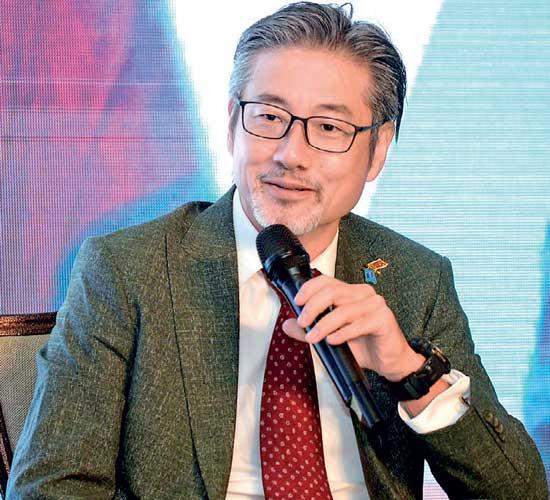Reply To:
Name - Reply Comment

Takafumi Kadono
By Shabiya Ali Ahlam
The Asian Development Bank (ADB) yesterday pledged its support to help Sri Lanka steer through the ongoing reform process; however, it noted that there needs to be “realistic expectations”.
Acknowledging that Sri Lanka is at the initial stages of implementing challenging reforms within a tight time-frame, the ADB emphasised the need for a more sustainable approach to their implementation.
“There needs to be a realistic expectation of what can be done. At the same time, the momentum has to continue and we need to avoid a situation of reform fatigue. There also needs to be continuous social and public support towards the reforms,” said ADB Country Director for Sri Lanka Takafumi Kadono.
He shared his views while addressing a panel discussion at the ADB Serendipity Knowledge Event, held in Colombo, focusing on its country partnership strategy.
In order for Sri Lanka to achieve success in its reform endeavours, Kadono emphasised the necessity for the government being open to consultation and engaging in more active public outreach. Kadono highlighted the importance of all economic stakeholders understanding the necessity of the reforms, despite their painful nature.
Despite the positive changes such as a decrease in inflation and improvements in other indicators that appear favourable on paper, the majority of the public in Sri Lanka are yet to experience the positive effects of these changes in their daily lives.
“So, it’s important to enhance that communication. Proactively engaging with the public would be a very important subject for Sri Lanka,” Kadono said.
Meanwhile, when questioned on the ADB’s view, as a development partner, on the government’s willingness to embark on these reforms, Kadono affirmed that as of date, there is strong willingness from Sri Lanka to bring about the necessary changes.
“I think there is a very strong drive. And we are very happy to be part of that.
Again, these reforms are not led by the ADB or IMF; these are reforms that are absolutely needed for the country to get out of the crisis and extract itself out from this hole and then to get on to this strong, sustainable path,” he said.
Meanwhile, efforts are underway for the ADB to kick off financing projects under the 2024-2028 country partnership strategy. The project finance is likely to start depending on Sri Lanka’s capacity to borrow.
Some of the key areas for project financing include education, irrigation and health.
Under its new operational model, the ADB aims to offer technical support and expertise beyond financing, by providing specialists in the relevant fields. Additionally, the ADB will facilitate private sector initiatives and public-private partnerships.